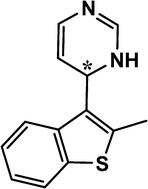In vivo phenotypic drug discovery: applying a behavioral assay to the discovery and optimization of novel antipsychotic agents†‡
Abstract
Phenotypic drug discovery (PDD) is increasingly being recognized as a viable compliment to target-based drug discovery (TDD). By measuring functional changes, typically at a systems level, PDD can facilitate the identification of compounds having a desirable pharmacology. This capability is particularly important when studying CNS diseases where drug efficacy may require modulation of multiple targets in order to overcome a robust, adaptive biological system. Here, we report the application of a mouse-based high-dimensional behavioral assay to the discovery and optimization of a structurally and mechanistically novel antipsychotic. Lead optimization focused on optimizing complex behavioral features and no explicit effort was made to identify the target (or targets) involved.


 Please wait while we load your content...
Please wait while we load your content...